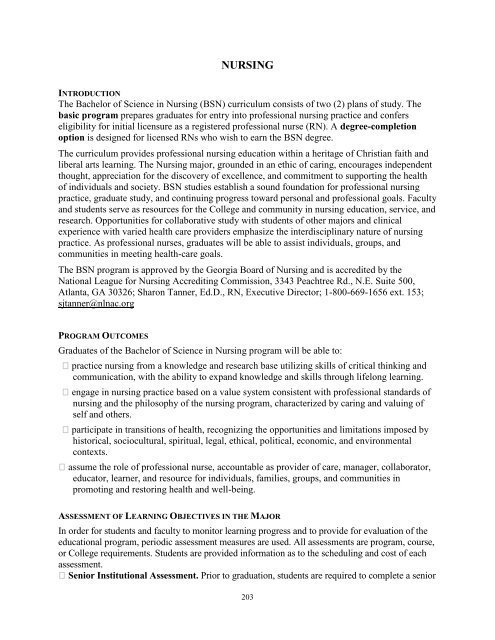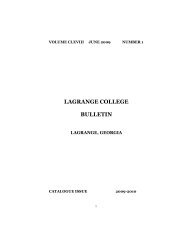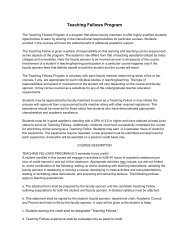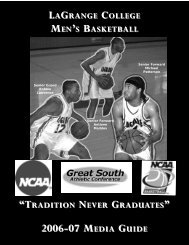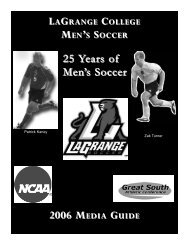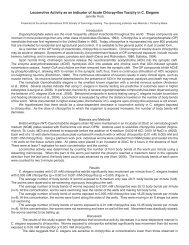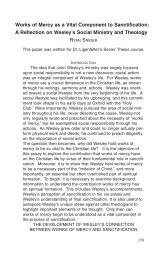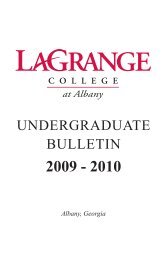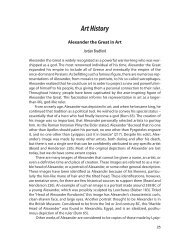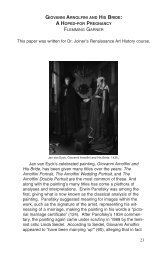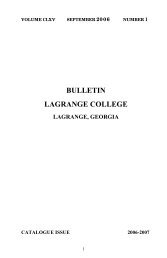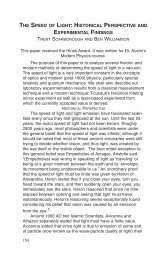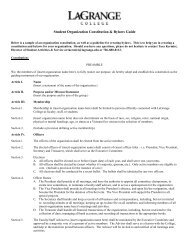undergraduate bulletin - LaGrange College
undergraduate bulletin - LaGrange College
undergraduate bulletin - LaGrange College
Create successful ePaper yourself
Turn your PDF publications into a flip-book with our unique Google optimized e-Paper software.
NURSING<br />
INTRODUCTION<br />
The Bachelor of Science in Nursing (BSN) curriculum consists of two (2) plans of study. The<br />
basic program prepares graduates for entry into professional nursing practice and confers<br />
eligibility for initial licensure as a registered professional nurse (RN). A degree-completion<br />
option is designed for licensed RNs who wish to earn the BSN degree.<br />
The curriculum provides professional nursing education within a heritage of Christian faith and<br />
liberal arts learning. The Nursing major, grounded in an ethic of caring, encourages independent<br />
thought, appreciation for the discovery of excellence, and commitment to supporting the health<br />
of individuals and society. BSN studies establish a sound foundation for professional nursing<br />
practice, graduate study, and continuing progress toward personal and professional goals. Faculty<br />
and students serve as resources for the <strong>College</strong> and community in nursing education, service, and<br />
research. Opportunities for collaborative study with students of other majors and clinical<br />
experience with varied health care providers emphasize the interdisciplinary nature of nursing<br />
practice. As professional nurses, graduates will be able to assist individuals, groups, and<br />
communities in meeting health-care goals.<br />
The BSN program is approved by the Georgia Board of Nursing and is accredited by the<br />
National League for Nursing Accrediting Commission, 3343 Peachtree Rd., N.E. Suite 500,<br />
Atlanta, GA 30326; Sharon Tanner, Ed.D., RN, Executive Director; 1-800-669-1656 ext. 153;<br />
sjtanner@nlnac.org<br />
PROGRAM OUTCOMES<br />
Graduates of the Bachelor of Science in Nursing program will be able to:<br />
practice nursing from a knowledge and research base utilizing skills of critical thinking and<br />
communication, with the ability to expand knowledge and skills through lifelong learning.<br />
engage in nursing practice based on a value system consistent with professional standards of<br />
nursing and the philosophy of the nursing program, characterized by caring and valuing of<br />
self and others.<br />
participate in transitions of health, recognizing the opportunities and limitations imposed by<br />
historical, sociocultural, spiritual, legal, ethical, political, economic, and environmental<br />
contexts.<br />
assume the role of professional nurse, accountable as provider of care, manager, collaborator,<br />
educator, learner, and resource for individuals, families, groups, and communities in<br />
promoting and restoring health and well-being.<br />
ASSESSMENT OF LEARNING OBJECTIVES IN THE MAJOR<br />
In order for students and faculty to monitor learning progress and to provide for evaluation of the<br />
educational program, periodic assessment measures are used. All assessments are program, course,<br />
or <strong>College</strong> requirements. Students are provided information as to the scheduling and cost of each<br />
assessment.<br />
Senior Institutional Assessment. Prior to graduation, students are required to complete a senior<br />
203


